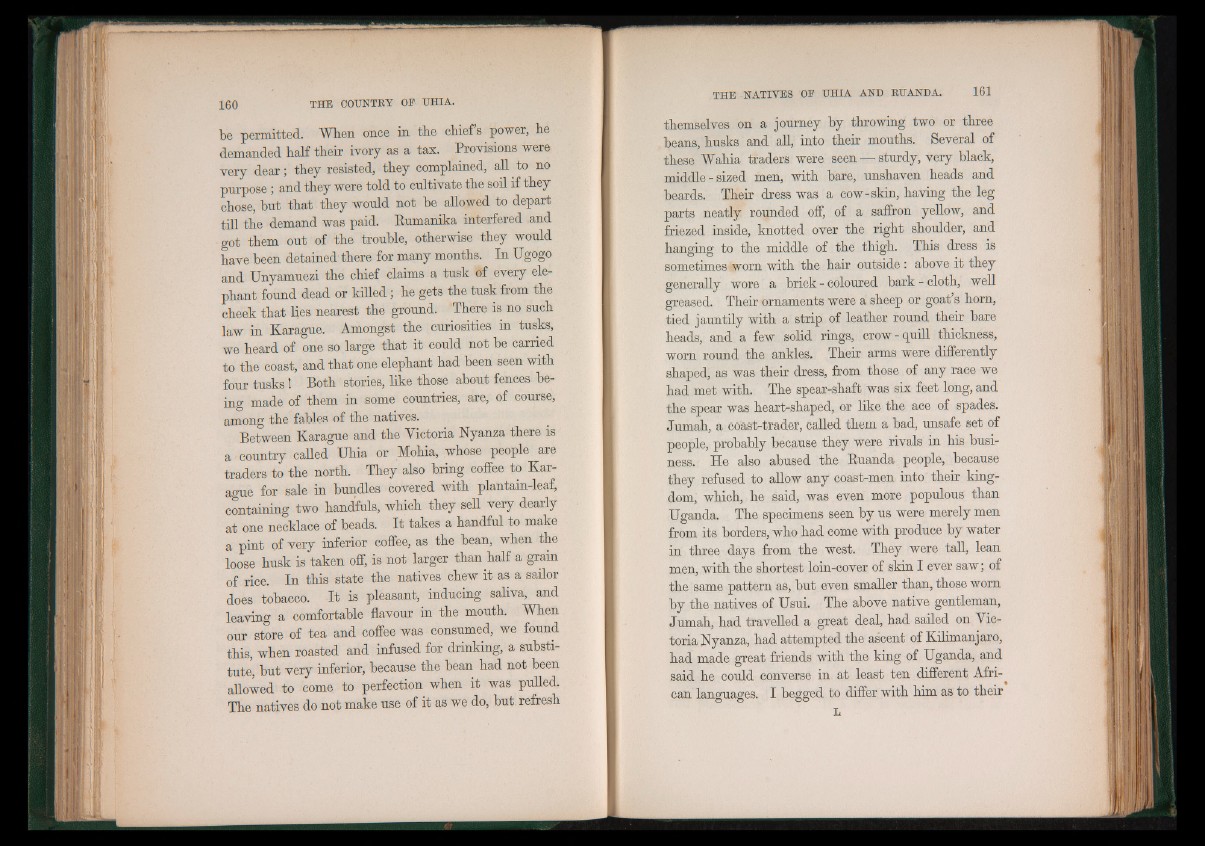
be permitted. When once in the chiefs power, he
demanded half their ivory as a tax. Provisions were
very dear; they resisted, they complained, all to no
purpose; and they were told to cultivate the soil if they
chose, but that they would not be allowed to depart
till the demand was paid. Rumanika interfered and
got them out of the trouble, otherwise they would
have been detained there for many months. In Ugogo
and Unyamuezi the chief claims a tusk of every elephant
found dead or killed; he gets the tusk from the
cheek that lies nearest the ground. There is no such
law in Karague. Amongst the curiosities in tusks,
we heard of one so large that it could not be carried
to the coast, and that one elephant had been seen with
four tusks! Both stories, like those about fences being
made of them in some countries, are, of course,
O .
among the fables of the natives.
Between Karague and the Victoria Nyanza there is
a country called Uhia or Mohia, whose people are
traders to the north. They also bring coffee to Karague
for sale in bundles covered with plantam-leaf,
containing two handfuls, which they sell very dearly
at one necklace of beads. I t takes a handful to make
a pint of very inferior coffee, as the bean, when the
loose husk is taken off, is not larger than half a grain
of rice. In this state the natives chew it as a sailor
does tobacco. I t is pleasant,^ inducing saliva, and
leaving a comfortable flavour in the mouth. When
our store of tea and coffee was consumed, we found
this, when roasted and infused for drinking, a substitute,
but very inferior, because the bean had not been
allowed to come to perfection when it was pulled.
The natives do not make use of it as we do, but, refresh
themselves on a journey by throwing two or three
beans, husks and all, into their mouths. Several of
these Wahia traders were seen — sturdy, very black,
middle-sized men, with bare, unshaven heads and
beards. Their dress was a cow-skin, having the leg
parts neatly rounded off, of a saffron yellow, and
friezed inside, knotted over the right shoulder, and
banging to the middle of the thigh. This dress is
sometimes worn with the hair outside : above it they
generally wore a brick - coloured bark - cloth, well
greased. Their ornaments were a sheep or goat’s horn,
tied jauntily with a strip of leather round their bare
heads, and a few solid rings, crow - quill thickness,
worn round the ankles. Their arms were differently
shaped, as was their dress, from those of any race we
had met with. The spear-shaft was six feet long, and
the spear was heart-shaped, or like the ace of spades.
Jumah, a coast-trader, called them a bad, unsafe set of
people, probably because they were rivals in his business.
He also abused the Ruanda people, because
they refused to allow any coast-men into their kingdom,
which, he said, was even more populous than
Uganda. The specimens seen by us were merely men
from its borders, who had come with produce by water
in three days from the west. They were tall, lean
men, with the shortest loin-cover of skin I ever saw; of
the same pattern as, but even smaller than, those worn
by the natives of Usui. The above native gentleman,
Jumah, had travelled a great deal, had sailed on Victoria
Nyanza, had attempted the ascent of Kilimanjaro,
had made great friends with the king of Uganda, and
said he could converse in at least ten different Afri-%
can languages. I begged to differ with him as to their
L